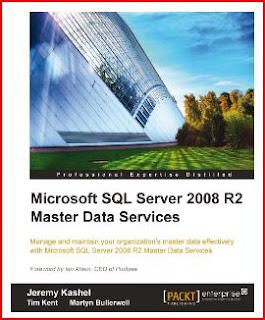 I read recently
a technical book – “Microsoft SQL Server 2008 R2 Master Data Services” (edited by
Packt Publishing).
I read recently
a technical book – “Microsoft SQL Server 2008 R2 Master Data Services” (edited by
Packt Publishing).
For those not familiar with the Microsoft’s homonymous product:
Master Data Services – briefly named
MDS from now – is the first step of Microsoft in the world of master data
management. Coming from the earlier Stratature’s acquisition, the product is
the first generation of a new BI-related family formed around SQL Server 2008
R2 and which tends to add more value at the business level, together with other
coming concepts in SQL Server Denali, like data quality services, “powerpoint”
for data, and others.
Now, as for
the book’s name, I have to say that
having several books named around the product’s name may become confusing and
hard identifiable – so I may have chosen something a bit different; but let it
be so, now.
Having a pretty good knowledge of the product, I was curious how this book addressed
a pretty narrow area – a niche one, I may say – knowing that it is difficult to
choose the level you target in that case (expert - specialized/very small
audience versus accessible-larger audience/boring/no added value). So first of
all, it was pretty obvious that a decent database developer/specialist could
easily start up on the knowledge of: master data management concepts; MDS
overview; MDS installation and configuration; creating and using models etc.
The tone “smoothly” changes when coming close to more specific concepts: version management, importing data and the staging process. I remarked that, for the ease of understanding, most of the tasks were explained from the eyes of a database guy – that is, what kind of DB operations are hidden behind the actions applied via the product’s web UI (because, right, almost all engine and features are database-based, if I can say so).
The tone “smoothly” changes when coming close to more specific concepts: version management, importing data and the staging process. I remarked that, for the ease of understanding, most of the tasks were explained from the eyes of a database guy – that is, what kind of DB operations are hidden behind the actions applied via the product’s web UI (because, right, almost all engine and features are database-based, if I can say so).
Where the things became really interesting was
on the integration side. And I can tell you there is the one of the main tricks. Here’s why:
because in fact – even at this early stage of development – Master Data
Services, while not exposing all the needed data integration features in an
advanced mode, it still hides inside what Microsoft have done everywhere:
integrating its various servers and technologies together and taking benefit
from the dialog of all these structures. But – very few examples were available
at that time – even I struggled a while and investigated a lot around the
integration solutions we may have. And here is the surprise – from the book:
- Input integration to the staging tables via SSIS (SQL Server Integration Services)
- A large sub-chapter dedicated to the business rules workflow extension via SharePoint (a full project solution example)
- Extracting data from MDS via subscription views and delivering master data via BizTalk Server (again, with sample databases, project/solution, schemas, map, ports etc.)
- MDS Web Service API, data integration with SharePoint Web Parts, and, again, with SharePoint Workflow, this time on the
way back to MDS for updating master data. I can tell you it is the only example
I found until now of a full roundtrip between MDS and SharePoint workflow.
What I found it’s missing/could be better:
- Some words about the deployment of a solution for Master data Services
- A
more detailed view on MDS security (the permissions propagation and deployment
can be very tricky)
With this,
I found overall that it was a good occasion for me to start a series of technical
book reviews – start with a good one :).